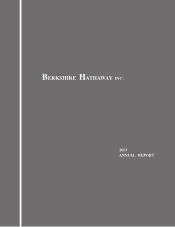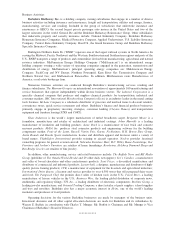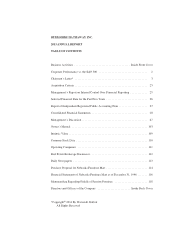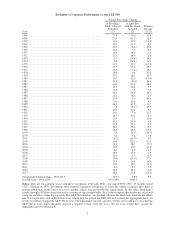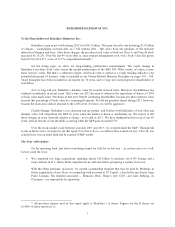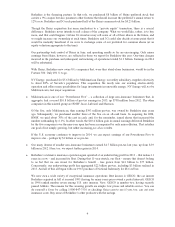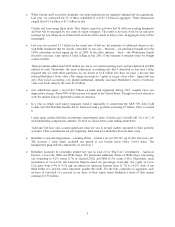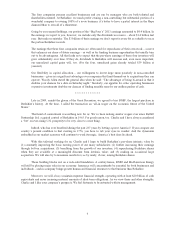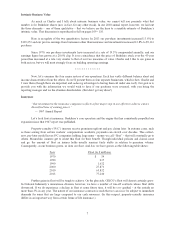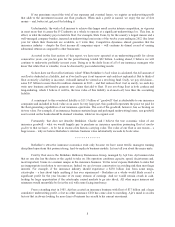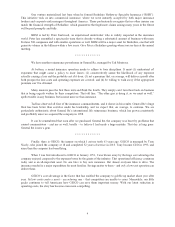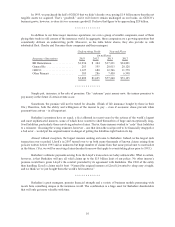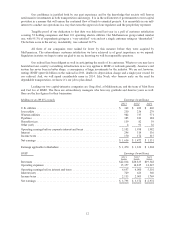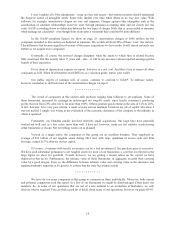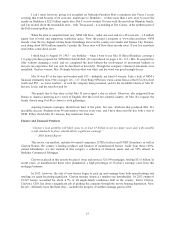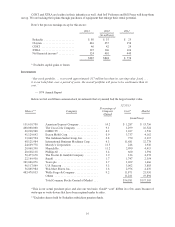Berkshire Hathaway 2013 Annual Report Download - page 8
Download and view the complete annual report
Please find page 8 of the 2013 Berkshire Hathaway annual report below. You can navigate through the pages in the report by either clicking on the pages listed below, or by using the keyword search tool below to find specific information within the annual report.The four companies possess excellent businesses and are run by managers who are both talented and
shareholder-oriented. At Berkshire, we much prefer owning a non-controlling but substantial portion of a
wonderful company to owning 100% of a so-so business; it’s better to have a partial interest in the Hope
diamond than to own all of a rhinestone.
Going by our yearend holdings, our portion of the “Big Four’s” 2013 earnings amounted to $4.4 billion. In
the earnings we report to you, however, we include only the dividends we receive – about $1.4 billion last
year. But make no mistake: The $3 billion of their earnings we don’t report is every bit as valuable to us as
the portion Berkshire records.
The earnings that these four companies retain are often used for repurchases of their own stock – a move
that enhances our share of future earnings – as well as for funding business opportunities that usually turn
out to be advantageous. All that leads us to expect that the per-share earnings of these four investees will
grow substantially over time. If they do, dividends to Berkshire will increase and, even more important,
our unrealized capital gains will, too. (For the four, unrealized gains already totaled $39 billion at
yearend.)
Our flexibility in capital allocation – our willingness to invest large sums passively in non-controlled
businesses – gives us a significant advantage over companies that limit themselves to acquisitions they can
operate. Woody Allen stated the general idea when he said: “The advantage of being bi-sexual is that it
doubles your chances for a date on Saturday night.” Similarly, our appetite for either operating businesses
or passive investments doubles our chances of finding sensible uses for our endless gusher of cash.
************
Late in 2009, amidst the gloom of the Great Recession, we agreed to buy BNSF, the largest purchase in
Berkshire’s history. At the time, I called the transaction an “all-in wager on the economic future of the United
States.”
That kind of commitment was nothing new for us: We’ve been making similar wagers ever since Buffett
Partnership Ltd. acquired control of Berkshire in 1965. For good reason, too. Charlie and I have always considered
a “bet” on ever-rising U.S. prosperity to be very close to a sure thing.
Indeed, who has ever benefited during the past 237 years by betting against America? If you compare our
country’s present condition to that existing in 1776, you have to rub your eyes in wonder. And the dynamism
embedded in our market economy will continue to work its magic. America’s best days lie ahead.
With this tailwind working for us, Charlie and I hope to build Berkshire’s per-share intrinsic value by
(1) constantly improving the basic earning power of our many subsidiaries; (2) further increasing their earnings
through bolt-on acquisitions; (3) benefiting from the growth of our investees; (4) repurchasing Berkshire shares
when they are available at a meaningful discount from intrinsic value; and (5) making an occasional large
acquisition. We will also try to maximize results for you by rarely, if ever, issuing Berkshire shares.
Those building blocks rest on a rock-solid foundation. A century hence, BNSF and MidAmerican Energy
will still be playing major roles in our economy. Insurance will concomitantly be essential for both businesses and
individuals – and no company brings greater human and financial resources to that business than Berkshire.
Moreover, we will always maintain supreme financial strength, operating with at least $20 billion of cash
equivalents and never incurring material amounts of short-term obligations. As we view these and other strengths,
Charlie and I like your company’s prospects. We feel fortunate to be entrusted with its management.
6

